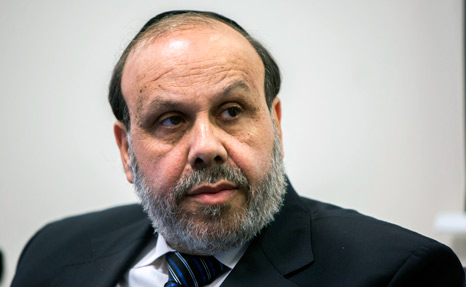An Open Letter to the New Minister of Religious Services
As the new government begins its work, Dr. Shuki Friedman, Director of IDI's Center for Religion, Nation and State, offers recommendations to Minister David Azoulay on how to keep the rabbinate relevant and improve its standing in Israeli society.

Published in: The Marker
To the Honorable Minister David Azoulay,
As Israel's Minister of Religious Services, you have been given a golden opportunity to bring great honor to Jewish tradition, with relative ease. Following are a few recommendations for ways in which you can do this:
- Increase efficiency: Religious services, like all other services, must be efficient and friendly; today, however, they are not. If you are wise enough to introduce necessary reforms in conversion, burial procedures, religious councils, and other matters, and if you make sure that your ministry is committed to quality service, you will win lots of points—including in Heaven.
- Eliminate duplication. After 67 years of statehood, Israel does not need a separate state-funded Ashkenazi rabbi and state-funded Sephardi rabbi for every city. This arrangement is unnecessary and superfluous. Do away with the unnecessary position, at least for the future. You have no idea (or maybe you do) how much unnecessary squabbling over issues of authority and jurisdiction you will save between rabbis. And how much money. That too is a mitzvah.
- Obey the law. This recommendation may seem obvious, but it isn’t. The law stipulates that local rabbis must retire at some point—at age 67 (for neighborhood and community rabbis), 70, or 75 (for rabbis of cities) at the latest. Today, however, there are many incumbent rabbis who have passed these age limits, who are not really functioning, and who continue to hold on to their seats. Now is the time to say goodbye to these officials—with the utmost respect and esteem for their long years of service—effective immediately. It may already be too late.
- Change the election process for municipal Rabbis. The Chief Rabbinate is continually losing its relevance. Hardly anyone wants it anymore and many people do whatever they can to avoid it. The ultra-Orthodox don't rely on the Chief Rabbinate, while the secular majority has no interest in it whatsoever until they have to use its services. Even the national-religious community has lost interest in it. Help the Chief Rabbinate save itself. Promote change in the way that the municipal Rabbis are selected by democratizing the process. Rabbis chosen by the residents of the cities and communities in which they serve are rabbis who can relate to their constituents and with whom the people will consult. If rabbis are chosen by the people they serve, they will be real religious leaders rather than authority figures imposed from above. This reform can effect meaningful change in Israel's Chief Rabbinate, preventing it from becoming completely irrelevant.
- Don’t create positions and make appointments for no reason. The State of Israel has limited resources. Streamline and economize. This is the order of the day throughout Israeli society, and especially for the Ministry of Religious Services, which has never been very good at such things.
- Do not take advantage of your authority. Authority, even religious authority, must be exercised with a pure heart and in a reasonable manner. This is not only the law of the State of Israel but is also the spirit of Jewish law and Jewish tradition. Please make use of the authority given to you with an open and a listening heart, and with sensitivity towards those who are in need of the services of your office. Act in accordance to the law, but also in accordance with the value of human kindness.
- Provide services to all. As Minister of Religious Services, you must provide religious services to all citizens who want them. You are not responsible for the worldview or religious practices of consumers of religious services; your ministry is simply the government body that provides them with services. Religious services, as well as the budgets allocated by the ministry, must be provided to all on an equal basis—whether the recipients attend your synagogue or a synagogue you would never set foot in (say, a Conservative synagogue). Remember: you are everybody’s minister.
Dr. Shuki Friedman is the Director of IDI's Center for Religion, Nation, and State.
This article was originally published in Hebrew in The Marker on May 31, 2015.
For a full list of IDI's recommendations for Israel's new ministers, please click here.
